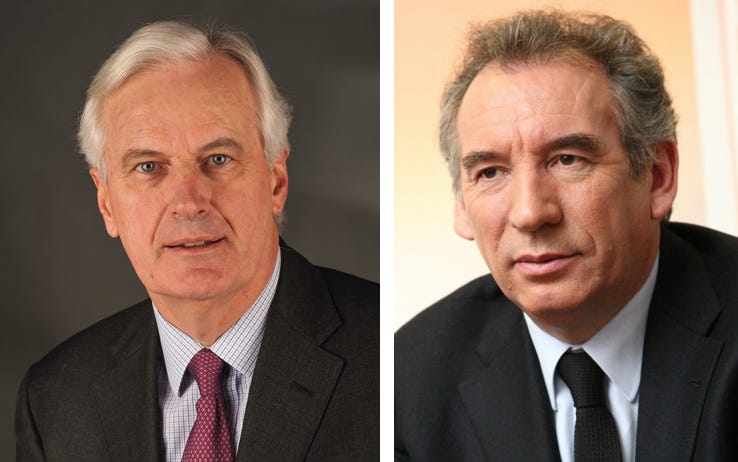
At the start of 2024, President Emmanuel Macron gave the traditional televised new year greeting. He predicted a year of “determination, choice, regeneration and pride.”
2024, année de détermination, de choix, de régénération, de fierté. Au fond, une année d’espérance.
Emmanuel Macron, 31 December 2023
So, was he right? Well, partly. Two major events gave France reason to feel proud.

The first was the Olympic Games in the summer. They were well organised and beautifully staged. While sabotage of the railway network on the opening day and a controversial-for-some opening ceremony risked spoiling the party, they were soon forgotten as the medals started to roll in for the host nation. France found a new champion in swimming legend Léon Marchand and, for a brief period, the seemingly impossible happened - the country was united.
A second moment of pride was the reopening of Notre Dame in December. After just five years, the burnt-out cathedral emerged looking more beautiful than ever.
Yet, the mood music playing in the background of both these events has been the seemingly endless political instability, all prompted by Macron himself.
European elections in June were bad news for the president and his governing party. That wasn’t much of a surprise as opinion polls had long predicted the far-right Rassemblement National would top the vote. What was surprising was Macron’s response. He appeared on TV shortly after polls closed to announce he was dissolving the national parliament and calling fresh elections.
That vote, in July, led to the political stalemate that has put France in a logjam ever since.

The Assemblée Nationale and its 577 députés are now split into three almost equal blocs. The biggest group is the left with 192 seats, next come the centrists with 164 seats and then the far-right with 141. The remaining seats are made up of smaller parties and independents.
This type of three-way split happens in many parliaments, so why can’t parties in France agree a broad coalition and find a way forward?
The problem is that the French parliament is particularly weak by European standards. The president has the right to dissolve parliament and then the right to choose the prime minister. There is no obligation to give the winning party the first chance to form a government.
From the outset, Macron has been unwilling to give the two largest blocs that opportunity, which is causing the constitutional impasse. He first turned to the centre-right Les Républicains (47 seats) and appointed the unelected Michel Barnier as prime minister. That lasted three months. In December, he turned to the even smaller MoDem party (36 seats) and put the also unelected François Bayrou in charge.

This imbalance in the French political setup may seem odd but it’s actually by design. From 1946 until 1958, France operated under what is known as the Fourth Republic. The president was more of a figurehead with parliament holding all the power. Yet, that period is remembered for its instability. In just twelve years, France had 22 governments.
When General de Gaulle came out of retirement in 1958 to take control of a crisis in Algeria, he put in process a plan to change the constitution. That created the current Fifth Republic. De Gaulle’s vision was to end the instability with a strong president and a weakened parliament. While that has worked for most of the 66 years since then, the cracks are now starting to show.
The power imbalance means that the parliament behaves like a group of squabbling children on the back seat of a car journey while the parents up front try to retain order. There’s little incentive for the parties to create alliances as the president pulls the strings.
Each time Macron has appointed a prime minister, the left-wing Nouveau Front Populaire (192 seats) and the far-right Rassemblement National and allies (141 seats) have cried foul. They both feel they should be given the chance to form a government.
All this appears to be building towards some kind of constitutional crisis. The Bayrou government is off to a shaky start. The Nouveau Front Populaire has already committed to tabling a censure motion in mid-January. If the government falls, Macron’s options appear limited.
He could bite the bullet and name a prime minister from the left. That would risk undoing some of his cherished reforms, such as the increase in the retirement age to 64. He could also name a prime minister from the far-right, although that would likely see yet another censure motion in parliament. He could go on naming centrists and hope that one of them finally manages to cling onto power until he is able to dissolve the parliament once again in July and call new elections. New elections could just produce a similar parliament to this one.
The final option is for the president himself to resign. Macron vowed he would not do that in his most recent televised address, but he has shown the capacity to surprise in the past.
As for the French themselves, almost two-thirds (64%) say they are unhappy with the choice of François Bayrou as the new prime minister and a similar number (67%) predict that his government will fall in a short space of time. Few people are expecting an end to the turbulence any time soon.
Happy new year to all readers and stay subscribed to French Politics to keep up with all that’s going on in 2025.
Links
President Macron’s new year greeting 31 December 2023 link
Party affiliation of members of the Assemblée Nationale link
History of the French Fourth Republic link
IFOP opinion poll on François Bayrou link






Interesting to read the historical background to this difficult political/constitutional situation.